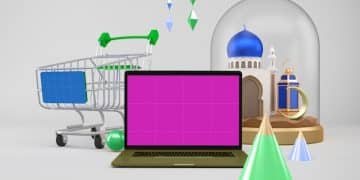Achieve Financial Freedom: A Freelancer’s Guide to Sustainable Income

Achieving **financial freedom through freelancing** is a journey that combines strategic planning, skill development, and consistent effort, empowering individuals to control their income and lifestyle.
Are you dreaming of a life where you control your income and set your own hours? Achieving financial freedom through freelancing: A step-by-step guide to building a sustainable income is within reach, offering a path to independence and a better work-life balance. This guide provides actionable steps to help you navigate the world of freelancing and build a secure financial future.
Understanding Financial Freedom Through Freelancing
Financial freedom through freelancing: A step-by-step guide to building a sustainable income involves creating a situation where your income from freelance work comfortably covers your expenses, allowing you to save, invest, and pursue your passions without financial stress. It’s about having the autonomy to choose projects, set your rates, and manage your time effectively.
Defining Your Financial Goals
Before diving into freelancing, it’s crucial to define what financial freedom means to you. Understanding your goals will help you stay motivated and focused as you build your freelance career.
- Calculate Your Monthly Expenses: Know exactly how much money you need each month to cover essentials.
- Set Income Targets: Determine how much you need to earn to meet your expenses and savings goals.
- Plan for the Future: Consider long-term financial goals like retirement, investments, and potential big purchases.
Achieving financial independence through freelance work offers numerous advantages, including flexibility, autonomy, and the potential for higher earnings. However, it also requires dedication, strategic planning, and a proactive approach to managing your career.

Identifying Your Freelance Skills and Niche
One of the first steps toward financial freedom through freelancing: A step-by-step guide to building a sustainable income is identifying your marketable skills. What are you good at, and what services can you offer as a freelancer? Finding your niche can help you stand out in a competitive market.
Start by listing all your skills. Think about your past jobs, hobbies, and any training or certifications you have. Consider what problems you are good at solving and what tasks you enjoy doing.
Popular Freelance Skills to Consider
Many skills are in high demand in the freelance market. Here are a few popular options to consider:
- Writing and Editing: Content creation, copywriting, and editing services are always needed.
- Web Development: Coding, website design, and maintenance are valuable skills.
- Graphic Design: Creating visuals for brands, websites, and marketing materials.
- Digital Marketing: SEO, social media management, and online advertising.
By identifying your skills and choosing a profitable niche, you can position yourself for success in the freelance market. This focus allows you to hone your expertise and attract clients who need precisely what you offer.
Building Your Freelance Portfolio and Online Presence
To attract clients and demonstrate your expertise, building a strong freelance portfolio and online presence is essential for achieving financial freedom through freelancing: A step-by-step guide to building a sustainable income. This showcases your best work and helps potential clients find you.
A compelling portfolio is your chance to shine. Include projects that highlight your skills and demonstrate your value to clients. If you are just starting, consider creating sample projects or offering your services at a reduced rate to build your portfolio.
Creating a Professional Website
Having your own website is a great way to showcase your work and establish your brand, crucial for long-term freelance sucсess.
- Choose a Domain Name: Select a domain name that is professional and easy to remember.
- Showcase Your Best Work: Feature your best projects and testimonials prominently.
- Include a Blog: Share your expertise and attract potential clients with valuable content.
A well-crafted online presence, including a professional website and active social media profiles, can significantly boost your chances of attracting clients and securing well-paying freelance projects. These assets serve as a digital storefront, showcasing your skills and building trust with potential clients.
Setting Your Rates and Pricing Strategy
Setting your rates can be challenging, but it’s a crucial step in achieving financial freedom through freelancing: A step-by-step guide to building a sustainable income. You need to ensure you are charging enough to cover your expenses, pay your taxes, and save for the future.
Research industry standards for your skills and niche. Look at what other freelancers are charging for similar services. Consider your experience level, the complexity of the project, and the value you bring to the client.
Understanding Different Pricing Models
There are several pricing models you can use as a freelancer:
- Hourly Rate: Charging a fixed rate for each hour you work.
- Project-Based: Quoting a fixed price for the entire project.
- Value-Based: Pricing your services based on the value you bring to the client.
Your pricing strategy is a reflection of your perceived value and plays a significant role in your financial success. Balancing competitive pricing with the need to earn a sustainable income is crucial for achieving long-term financial freedom as a freelancer.

Finding and Securing Freelance Clients
Finding clients is an ongoing process, but it’s essential for maintaining a steady income stream and achieving financial freedom through freelancing: A step-by-step guide to building a sustainable income. There are numerous online platforms and strategies you can use to find freelance work.
Online freelance marketplaces are a popular place to start. Platforms like Upwork, Fiverr, and Freelancer.com connect freelancers with clients from around the world. Create a profile, showcase your skills, and bid on projects that match your expertise.
Leveraging Networking and Referrals
Networking and referrals will help you find clients organically
By actively seeking out clients and consistently delivering high-quality work, you can build a solid client base that supports your journey toward financial freedom as a freelancer. Diversifying your client base reduces your reliance on any single client and provides greater income stability.
Managing Your Finances and Taxes as a Freelancer
Financial freedom through freelancing: A step-by-step guide to building a sustainable income also requires you have solid finance management practices, which include budgeting, saving, and handling taxes.
Create a budget to track your income and expenses. Use accounting software to monitor your cash flow and identify areas where you can cut costs. Set financial goals and create a plan to achieve them.
Understanding Freelance Taxes
Freelancers are responsible for paying self-employment taxes, which include Social Security and Medicare taxes. Make sure to set aside a portion of your income to cover these taxes.
Effective financial management and tax planning are essential for ensuring long-term financial stability and freedom as a freelancer. By taking control of your finances and staying organized, you can minimize stress and maximize your earnings.
| Key Point | Brief Description |
|---|---|
| 🎯 Goal Setting | Define clear financial goals to stay motivated. |
| 💼 Skill Identification | Identify and market your most valuable skills. |
| 🌐 Online Presence | Build a professional portfolio and online presence. |
| 💰 Financial Management | Manage finances and taxes effectively. |
Frequently Asked Questions
It’s achieving a level of income from your freelance work that comfortably covers your expenses, allowing you to save and invest without financial stress.
Research industry standards, consider your expertise, and factor in your expenses and desired income. Balance competitiveness with your financial needs.
Explore platforms like Upwork, Fiverr, and LinkedIn. Also, network, seek referrals, and create a strong online presence to attract clients.
Create a budget, track income and expenses, and set aside money for taxes. Consider using accounting software to stay organized and manage your cash flow.
Freelancing offers flexibility, control over your income, and the potential to earn more than in traditional employment. It allows you to pursue passions and achieve a better work-life balance.
Conclusion
Achieving financial freedom through freelancing is a realistic and rewarding goal. By following these steps, you can build a sustainable income, gain control over your career, and ultimately achieve the financial independence you desire.





